- Home
- Scott Westerfeld
Zeroes Page 5
Zeroes Read online
Page 5
Fuentes laughed—which surprised Ethan, because he hadn’t thought the big man could. King gave Ethan a conspiratorial smile, halfway between amusement and pity.
Ethan opened his mouth and prayed the voice had something. “Right. I remember the robber said something about stealing Sonia’s ring because he wanted to give it to someone called Kelsie. I mean, the audio’s pretty muffled right there, but it kind of jolted my memory.”
Ethan had to stop himself from letting out a sigh of relief. The voice was right about the audio. Jerry could’ve said something the detectives had missed.
But Fuentes’s gaze only sharpened. “Funny thing. You said you were in that bank to open an account.”
“Yeah?” Ethan was wary.
“How you going to do that without any ID?”
“Didn’t know I’d forgotten it.” Thing was, Ethan almost never carried ID. It was totally unhelpful to carry ID if you were going to lie about yourself all the time. “So is there anything else, Detectives?”
King shrugged. For a second Ethan thought maybe he’d gotten away with it. All of it.
But then Fuentes said, “So what’s in the duffel bag, kid?”
Ethan’s brain sputtered almost to a halt. He could think of nothing except how wrong it had all gone, starting with his date with Indira. He slumped, letting the voice say whatever it would take to distract them from the bag. “I just realized something, Detectives.”
Fuentes smirked. “That it’s time to come clean?”
“That you can’t question a minor without the permission of a legal guardian.”
Both detectives were still, so Ethan figured it must be true. Score one to the voice. Then King smiled that friendly smile again.
“But you aren’t a suspect, Terrence. You’re a witness. And we’re just having a friendly chat. What do you need a guardian for?”
“Yeah,” Fuentes chimed in. “I’m sure you want to help us out, don’t you?”
“I’m a minor,” the voice said with absolute certainty. “So an adult of some kind must be present during questioning. And although my father is unreachable, I just remembered the number of our lawyer here in Cambria.”
King nodded slowly. “You did, huh?”
“His name is Scamiglia,” the voice said, then rattled off a phone number.
The moment the first few digits were out of Ethan’s mouth, he tried to stop himself, but he was too tired, too beaten down by fear, and the voice had been in control of his tongue too much lately.
It was the number of an old pal of his—an ex-pal, really. The head of the Zeroes, who had an ability that was a hundred times more insidious than Ethan’s voice. A kid so condescending and imperious that even his best friends called him Glorious Leader.
And thanks to what the voice had said last summer, Ethan was no longer his friend at all.
Detective King scribbled the number down on a pad. “Finally we’re getting somewhere. Can’t wait to see what this Scamiglia guy has to say about you. How do you spell his name? S-C-A-M-something?”
“Four letters is all you’ll need,” Ethan said in his own exhausted voice. “Just call him. He’ll send someone right away.”
CHAPTER 14
FLICKER
“WHEN WAS THE FIRST TIME you remember your sister reading to you?”
Flicker kept her expression neutral. This sounded a lot like Dr. Bridges’ favorite topic, hidden inside a new question. She answered warily: “I don’t know how old we were, maybe six? But I remember the book. It was about slugs.”
She heard the squeak of leather, Dr. Bridges shifting in his chair.
“Slugs?”
“They wore clothes and lived in houses. Lily described all the pictures to me.” Flicker let herself smile. It had been a very silly book, full of squishy sound effects.
She could hear Dr. Bridges scribbling on his legal pad, and was tempted to peek but didn’t. She was trying to be good.
“And your sister reading it to you, that was important?”
“Sure.” More important than she could say, at least to her shrink. It was while Lily was reading to her that Flicker’s power had revealed itself for the first time. She hadn’t understood back then, of course. The spindly insects of letters had simply appeared in her head, skittering back and forth with the motion of Lily’s eyes.
Flicker sometimes missed those long-ago days, when her power hadn’t worked with anyone but Lily. Back then they’d thought it was some kind of twin magic, like the private language they’d shared in the crib. It had almost felt like a betrayal when Flicker started seeing through the rest of humanity’s eyes.
“It makes you feel like part of the family?”
Flicker sighed. It was the same old issue, the thing that brought her into this office every Friday, along with the neuroses of her overachieving parents.
So she didn’t feel bad about peeking. Dr. Bridges’ handwriting was a disaster, but he was staring straight at his pad. He’d written family narrative in big letters, and his pen was drawing circles around the words now, as lazy and patient as a shark.
What the hell did family narrative mean? That she and her sister loved to share stories? Or that Dr. Bridges thought Flicker was making something up?
His gaze lifted from the legal pad, and she saw herself—the bright orange summer dress for visibility in crowds, her brown hair spilling across the dimpled leather of the patient couch.
She smiled, just to see it.
“Is something funny?” Dr. Bridges asked.
“Lily’s a part of me, whether she reads to me or not.”
“Ah.” He took the bait, and his eyes went down to the pad again, where his pen was already scrawling the words twin bonding. Dr. Bridges was so predictable. He had a serious shrink boner for the fact that she and Lily had shared a womb. “But what if you learned to read for yourself? How would it change things between you and your sister?”
“It’s not that I can’t . . .” Flicker bit off the rest of her answer.
This was the never-ending issue, the reason her parents sent her to a shrink: Why had she stopped reading braille? Why did she stay so dependent on her sister? How could her parents, with three doctorates between them, have raised an illiterate sixteen-year-old?
Of course, all those questions were based on bullshit assumptions. Maybe one in ten blind kids bothered learning braille these days. Her parents didn’t understand that braille meant big clunky books that marked you as different, while audiobooks lived invisibly on your phone and text-to-speech gave you the whole damn internet.
Besides, Flicker could read perfectly well. Just not with her own eyes.
And there was something important that happened when her sister read to her. The stories became more real, more magical, the way stories had been when Flicker was little, before she could see at all.
“Can’t what?” Dr. Bridges prompted.
Flicker strained into the corners of his vision until she glimpsed the timer on his desk. Good. Her fifty minutes were almost up.
“It’d take more than thirty seconds to tell you,” she said.
His eyes went to the timer, then widened a little.
“I still don’t know how you do that.” She heard his smile.
“Blind-people powers.”
He wrote those words down, and then his left hand waved around, like he was trying to think of what to say.
“I can hear it in your voice,” she said. “When the session’s almost over.”
“You don’t have to worry about me, Riley. This is your time.”
Flicker sighed again, more at her real name than anything else. Real names were stupid, especially when you had one that your friends had given you. One that made perfect sense.
She stayed silent until the timer softly chimed.
Dr. Bridges straightened in his squeaky chair. “Next time, I want to talk about independence.”
Independence? She’d come here downtown all on her own, just like every week. No
parents waiting for her in the parking lot. No service dog. But her power needed other people to work, and that was fine with her.
Flicker swung her legs off the couch and stood. In a few swift steps she was at the door, her hand finding the knob without any help from Dr. Bridges’ eyes.
“You’ll think about that this week, Riley?” His voice followed her. “About things you can do to be more independent?”
Flicker turned to face him and threw her vision into his to admire her own expression. Enough of a smile not to be rude, but one mocking eyebrow arching behind dark glasses.
“Sure thing, Doc.”
* * *
Out on the front steps she turned her phone on, and it chirruped with annoyance. Her shrink’s office was a black hole of No Phones Allowed, not even in the waiting room, to allow patients to “center themselves” before their sessions. It was a law of nature that the week’s most interesting messages always arrived during those fifty minutes.
Flicker started walking, one hand sliding along the iron rail in front of the medical building, her other thumb moving across the haptic keys of her phone. A moment later Nate’s voice was in her ear: “Crazy news, Flick. There was a bank robbery this morning. And Scam’s at the police station downtown, in custody.”
Flicker came to a halt, despite the downtown crowd flowing around her. That name still set off stink bombs in her stomach.
“I’ll call the others,” Nate was saying. “But . . . it’s Scam. Maybe no one shows up, you know?”
Flicker did know. With a snap of her wrist she unfolded her cane. Here in the crowded streets of downtown, she didn’t need it. But the red and white made people get out of her way.
“Call me when you get this,” Nate finished. “And head for downtown.”
She was moving already, the cane sweeping the pavement in front of her. For the moment she kept herself blind. It was easier to think, and her shrink’s office was only a few blocks from the CCPD. No need to rush.
Not for Scam, anyway.
What bank robbery? And why would he need to rob a bank? The guy had been born to weasel people out of their cash.
She held down her phone’s voice-dial key and said, “Glorious Leader.”
Flicker still called him that, out loud when he was being annoying and in her head always. It was only half ironic, because no other pair of words suited him better.
“Flick!” he answered. “It’s shrink day, right? Tell me you’re already downtown.”
“Just like every Friday. Why the hell did Scam rob a bank?”
“Him? Please,” Nate said with a laugh. “The detective said he was a ‘material witness.’ His mouth must have gotten him in trouble.”
Something was approaching from behind her on the sidewalk, the metal clicks of a coasting bicycle. Flicker cast her vision into the rider’s eyes just as the guy spotted her cane. The view swerved away, bumping down the curb and back onto the street.
She let herself go blind again. “And he called you?”
“Because he’s got so many other friends? He told them I was his lawyer, but the detective wouldn’t let me talk to him. Whatever’s going on, they don’t think he’s an innocent bystander.”
“Weird. His voice must be slipping.”
“Scam’s power has always been . . . shaky. Tell me you’re coming, Flick.”
She sighed. “Wouldn’t miss it. Where should I meet you?”
“I’m staying away. The cops have my number. I don’t want to be anywhere close, just in case Crash decides to help. No telling what she’ll do to a police station.”
“Wait. She might actually show up?”
A pause. “No answer. She probably hasn’t checked her phone yet.”
Flicker sighed. After Scam’s outburst at Crash almost a year ago, even the charms of Glorious Leader might not convince her to help. Of course, what Scam had said to Nate and Flicker had been almost as cruel.
There was a pause on the other end, like Nate was thinking the same thing.
But then he said, “Stay outside the station, in case it gets messy. I’ll conference you in when I have everyone.”
Everyone? she almost asked, meaning her and Crash? But then a trickle of memory reminded her that there was someone else. That other Zero.
The tip of her cane caught on a sidewalk crack, jolting the thought away.
“I’ll have eyes inside the cop shop in ten minutes.” She’d slipped into the way they’d talked back in the old days. All those training missions, shepherding crowds around a shopping center while listening to Glorious Leader’s orders in their earbuds. Always pretending there was a fire or a terrorist attack, when it was really just Crash letting loose.
Flicker had always thought the missions were silly, Glorious Leader trying to forge a superpowered posse for his own mysterious purposes. But after Scam’s little outburst had broken the group, she’d dumped her real name and become Flicker all the time. Maybe that was a sign that she missed that energy, that focus.
“Tell me when you hear from Crash.”
“Roger that. Be careful, Flick”—and Nate was gone.
As always, there was that abandoned feeling of his glorious attention moving away from her. His power didn’t work through the phone, of course, but the reaction was hardwired in her now.
Separation anxiety. That’s what Dr. Bridges would call it.
She took a deep breath and flung aside the feeling, sending her vision flicking through the crowd. A hundred different perspectives went through her head—from a passing cab, a gliding skateboarder, an upstairs window—each for a fraction of a second. Her orange dress tugged at them, a single point of reference for all those jittering, moving eyeballs. She oriented herself, then flung her gaze out farther, casting it down the street toward the center of downtown.
A moment later she had it—a view through the eyes of someone gawking up at the stone facade of the Cambria City Police Department.
It gave Flicker a moment of pleasure to think that Scam was trapped in there, stewing in his own lies and probably wondering if any of his former friends would bother to dig him out.
CHAPTER 15
CRASH
CHIZARA PLUGGED THE BOOM BOX into the wall and switched it on. The power ran straight in and did what it was supposed to, grabbed the radio waves and pumped the music out into the shop. It had been tuned to a trance station.
“Woo-hoo,” said Bob mildly from the other workbench. “It’s a-li-i-ive.”
Chizara smiled. It was a good feeling, bringing an appliance back to life. It was slow and clunky, arranging the metal and plastic pieces by hand, soldering things together, testing individual connections. But it was restful, because ancient devices like the boom box weren’t smart enough to turn around and bite her.
That was why she was here; that was why she’d begged Bob for a job. I’m always fixing stuff, she’d flat-out lied. People say I have a knack.
People said no such thing, but she’d been prepared to develop a knack, with pure willpower and asking a truckload of questions. Her mother’s favorite proverb was “She who asks questions cannot go astray.”
It was worth lying to be allowed to work in Bob’s fix-it shop full of vacuum cleaners and toasters. Here in the Heights the nearest networked thing was two shops away, no more painful than a mild ice-cream headache.
Chizara clicked through the radio presets and let the owner’s selection of bass beats and street chants thunder out for a few seconds. Bits of the casing rattled in time with it. She pulled the plug and stood up.
“Oh, and I was enjoying that so much,” Bob said with a roll of his eyes. He only liked old-school jazz. He was working on a disassembled laptop—the best kind, as far as Chizara was concerned. Computers were rare visitors to the shop—most people in the Heights didn’t own one. “You gonna sew her up, Doc?”
“Stretch break first. My head hurts.”
Bob understood the need to walk away from close-in work every now and again, bu
t he pretended to be disappointed in her. “I don’t know, Chizara. Job’s not done till it’s done.”
“Yeah, but I’m young and flighty. You have to make allowances.”
Bob gave a little grin. His pale fingers scrabbled after a tiny Phillips-head screw that had rolled away across the benchtop. “Go on, then. Take your break. You can close it up when you get back.”
Chizara went out into the alleyway behind the workshop. They got along, she and Bob, and they were getting along better the more names for things she learned. He was teaching her the words that maker geeks used: “resistors” instead of “hiccups,” “fuses” instead of “blurt catchers.” She was learning the ancient history of the things that hurt her, seeing them for how they worked and what they did, piece by piece, before they’d all been shrunk down and melded into microchips. And she was also picking up how to seem normal, how to fake her testing, as if she couldn’t simply see the pulsing veins inside the machines.
Hiding her ability was an old habit, but if Chizara ever wanted to use her power in a real job, she needed to develop a full set of geek-compatible camouflage. Bob’s shop was a slow start, but it was a start. And he paid her to learn, which was more than school ever did.
She tipped her head back to soak up the sunshine for a few seconds, then crossed the alley into the shade. She pulled out her phone, steeled herself, and switched it on, checking her messages as per the agreement with her mom.
I don’t care if it niggles you, Mom always said. I need to know where you are.
How had mothers managed, before everyone carried these machines that chattered in Chizara’s head, sang in her bones, itched under her skin? How had they not gone crazy with worry?
Chizara leaned against the cool of the brick wall and rubbed her face, which was all atickle from the phone, or maybe from the repeater tower nearby. She could see it above the roofline of the shops, throbbing out its signals at her.
Her thumb was poised to power the phone off when it buzzed and beeped and zapped her hand again.

 Uglies
Uglies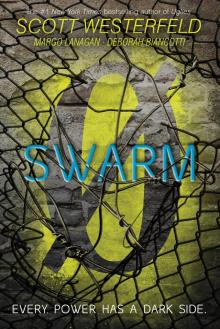 Swarm
Swarm Pretties
Pretties Zeroes
Zeroes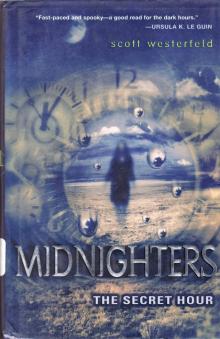 The Secret Hour
The Secret Hour Behemoth
Behemoth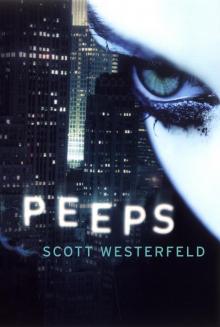 Peeps
Peeps Specials
Specials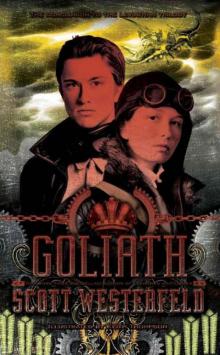 Goliath
Goliath Leviathan
Leviathan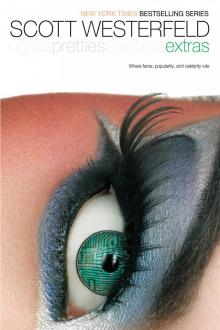 Extras
Extras Shatter City
Shatter City The Risen Empire
The Risen Empire Touching Darkness
Touching Darkness The Last Days
The Last Days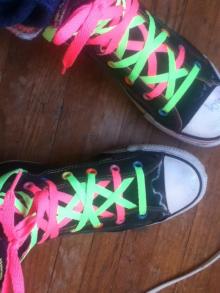 So Yesterday
So Yesterday The Killing of Worlds
The Killing of Worlds Afterworlds
Afterworlds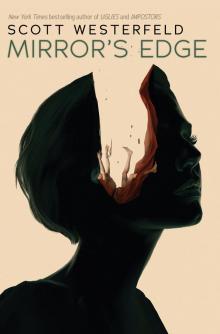 Mirror's Edge
Mirror's Edge Evolution's Darling
Evolution's Darling Blue Noon m-3
Blue Noon m-3 Touching Darkness m-2
Touching Darkness m-2 Impostors
Impostors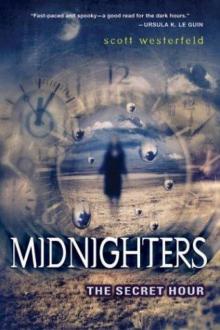 The Secret Hour m-1
The Secret Hour m-1 Leviathan 01 - Leviathan
Leviathan 01 - Leviathan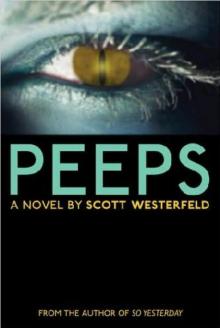 Peeps p-1
Peeps p-1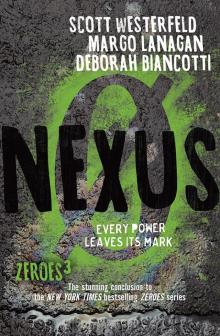 Nexus
Nexus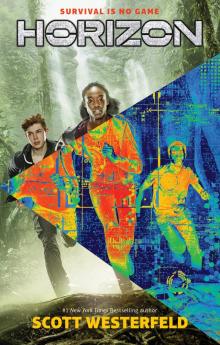 Horizon
Horizon Bogus to Bubbly
Bogus to Bubbly Goliath l-3
Goliath l-3 The Last Days p-2
The Last Days p-2 Behemoth l-2
Behemoth l-2 Stupid Perfect World
Stupid Perfect World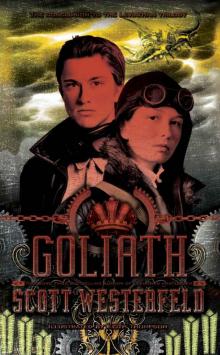 Goliath (Leviathan Trilogy)
Goliath (Leviathan Trilogy)